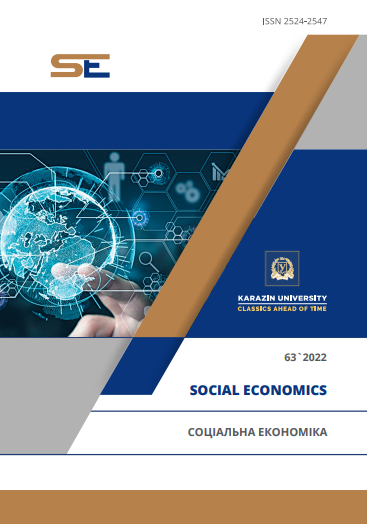INTERNATIONAL CONVERGENCE OF FINANCIAL REPORTING
Abstract
The purpose of this article is to study the state of global convergence of financial reporting standards at the present stage, as well as to consider the key points of the process of unification of International Financial Reporting Standards (IFRS) and Generally Accepted Accounting Principles (GAAP). To achieve this goal, the article considers the concepts of convergence, harmonization and standardization, presents an analysis of the intensity of use of these concepts, which are associated with the dynamic development of recent global accounting transformations and major trends in international convergence of financial reporting. The key stages of the process of unification of International Financial Reporting Standards (IFRS) and Generally Accepted Accounting Principles (GAAP) are considered. For decades, the European Union, the International Organization of Securities Commissions (IOSCO) and the Committee on International Accounting Standards have supported international efforts to harmonize US GAAP and IFRS. accounting and reporting standards used in different countries. We have determined that while both IFRS and GAAP aim to provide transparency, informational content and usability in financial statements, these standards use different approaches to achieve this. We indicated that at present IFRS is the dominant accounting and reporting system, in fact, only third world countries do not apply it. We have proven that in the process of achieving convergence, a single set of understandable and feasible international accounting standards must be developed, requiring high quality, transparent and comparable information in financial statements in order to ensure convergence of IFRS and GAAP. We analyzed the intensity of the use of the concepts of IFRS and GAAP, which are associated precisely with the convergence of these accounting systems using the Google Ngram Viewer (GNV) tool. We have proved that the Convergence of IFRS and GAAP also applies to Ukraine, since the convergence is bilateral, any change in IFRS will ultimately affect the Ukrainian accounting and reporting system.
Downloads
References
Yefimenko, V. I. (2011). Directions of harmonization of accounting and reporting in Ukraine. Finance, accounting and auditing, 8, 278-284. (in Ukrainian)
Tovkun, L. V. (2019). International Financial Reporting Standards: Features of Implementation in Ukraine. Legal research, 4, 272–275. (in Ukrainian)
Pasko, O. V. (n.d.). Global convergence of financial reporting standards: status and prospects. Accounting and finance of agro-industrial complex: accounting portal. (in Ukrainian)
Radova, O. V. (2017). Problems of adaptation of the domestic accounting system to international standards. Economy and society, 10, 786–789. (in Ukrainian)
Petruk, O. M. (2006). Development of the national accounting system in Ukraine: strategy, harmonization, regulation: monograph. ZhSTU. (in Ukrainian)
Kurilo, G. M. (2014). Prospects for the convergence of IFRS with the US GAAP: the relationship with the integration process in Ukraine. Accounting, analysis and audit: problems of theory, methodology, organization, 1, 152-161. (in Ukrainian)
Nyshenko, L. P. (2007). Harmonization of accounting and financial reporting of Ukraine with international standards. Kiev. (in Ukrainian)
Akimova, N. S. (2018). International convergence of accounting standards. Eastern Europe: Economy, Business and Management, 4 (15), 394-402. (in Ukrainian)
Sanko, H., & Koldovskyi, A. (2017). Comparative Analysis of IFRS and US GAAP. Financial Markets. Institutions and Risks, 1, 14-21. (in Ukrainian)
Street, D. L. (2002). GAAP 2002: Convergence. Study of the efforts of different countries to disseminate and achieve convergence with IFRS.
Mc Enroe, J. E., & Sullivan, M. (2014). The rise and stall the U.S. GAAP and IFRS convergence movement. The CPA Journal, 84(1), 14-19.
Asvae, A. (2019). Accounting and auditing according to international standards in terms of integration into the world economy. Kharkov. (in Ukrainian)
Pacter, P. (2015). IFRS as global standards: a pocket guide.
Erchinger, H. (2012). IFRS and the United States - Developments and Current States. Australian Accounting Review, 22(3), 248-256.
Erchinger, H., & Melcher, W. (2007). Convergence between US GAAP and IFRS: acceptance of IFRS by the US securities and exchange commission (SEC). Accounting in Europe, 4, 13-24.
Negash, M., Holt, A., & Hathorn, J. (2017). The changing IFRS debate in the USA: a rejoinder. Journal of Accounting & Organizational Change, 13(1), 65-84. doi: https://doi.org/10.1108/JAOC-02-2015-0020.
Work plan for the consideration of incorporating international financial reporting standards into the financial reporting system for US issuers: final staff report. (2021). Retrieved from https://www.sec.gov/spotlight/globalaccountingstandards/ifrs-work-plan-final-report.pdf.
Barth, M. E., Landsman, W. R., Lang, M., & Williams, C. (2012). Are IFRS-based and US GAAP based accounting amounts comparable? Journal of Accounting and Economics, 54(1), 68-93.
Hail, L., Leuz, C., & Wysocki, P. (2010b). Global accounting convergence and the potential adoption of IFRS by the U.S. (part II). Accounting Horizons, 24(4), 567-588.
Leuz, C. (2003). IFRS versus US GAAP: information asymmetry-based evidence from Germany’s new market. Journal of Accounting Research, 41(2), 445-472.
Roadmap: Comparing IFRS Standards and U.S. GAAP. (2021). Retrieved from https://www.iasplus.com/en/publications/us/ifrs-gaap-comparison.




